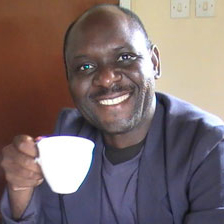 Martin Niboh, Ph.D. was born into poverty in a small village in Cameroon, Africa, on March 18, 1963. Due to a prolonged argument among family members that the kinship of the couple was too close (5th cousin or so), Martin’s parents were never able to marry. His biological father decided to move on, but not before Martin was conceived, leaving his mother, Helen, a teen-age mom with few options for caring for her son. While Martin was a toddler, Helen worked on a farm for about $1/week.
Martin Niboh, Ph.D. was born into poverty in a small village in Cameroon, Africa, on March 18, 1963. Due to a prolonged argument among family members that the kinship of the couple was too close (5th cousin or so), Martin’s parents were never able to marry. His biological father decided to move on, but not before Martin was conceived, leaving his mother, Helen, a teen-age mom with few options for caring for her son. While Martin was a toddler, Helen worked on a farm for about $1/week.
Being a precocious and very clever child, Martin was a little too much for Helen to handle as she worked. Helen sent 3-year-old Martin to school with his uncle, where he sat on the dirt floor in the back of the room. Feeling that he was too much of a nuisance, the teacher told the uncle to drop Martin off at the first grade. He had no chalk, no slate, and no seat; he just sat in the dust and copied things into the dust. When this teacher realized Martin was copying what she was writing on the board, she brought him a piece of wood to write on. Martin completed his first experience at schooling by the time he was only 10 years old, an age when most youths in Cameroon are just beginning their formal education!
Around this time, Helen met a man with the last name of Niboh. She wanted a father for Martin. He had served in the military and he liked Martin. Mr. Niboh was a good man and, although he desired to help Martin with further schooling, he was in no position to do so.
Martin had an idea that if he moved to the city and attended an auto mechanics program, he could get a driver’s license at age 17, repair vehicles, and become a taxi driver. The down payment for the program was $200-$300. He figured if he and his mother stopped working on the farm and started a produce market, they could save $2/week. By the end of the year, they had saved $100 toward this goal.
On the way to the farm one day, Martin had a chance encounter with a teacher, who wondered why he wasn’t in school. The teacher was shocked to discover that Martin had already completed primary school. A few weeks later, this teacher told Martin about a competitive examination held by the government for a scholarship to a vocational junior high school. He knew Martin was helping his mother from 7:00am to 7:00pm, but offered to help prepare Martin for the exams in the evening. He sat for the exams and received the scholarship.
So, away Martin went to boarding school, while his mother worked to buy books. At the end of four years, he was the top student in the school. He learned the trade of brick-laying and wanted to go to high school, but there was not one for brick-laying.
Martin convinced his mom that if she bought the books that were used by students in the general high school, he could study at home and sit for the final exam that the junior high general students would take. He planned to cover in one year what the general school students covered in five. Even for those attending, the failure rate was high. His mom thought he was crazy and his dad thought he should just get a job as a bricklayer.
Although it caused friction with his dad, Martin was able to use the funds they had saved earlier to buy the needed books. At the end of the year, Martin took the exam and finished eighth in the country! After Martin was written about in the newspaper and the news was broadcast on the radio, Mr. Niboh quickly changed his tune and took credit for everything his son had accomplished!
After the news got out that Martin had basically taught himself, he received a scholarship to go to high school six hours away. He went to this boarding high school for two years and graduated at the top of the class, again receiving a scholarship, this time to college. Unfortunately, at that time there was no English-speaking university in Cameroon. Although his French was poor, he was able to gain admission to the university in the French-speaking part of Cameroon. Despite his initial deficiencies in the French language, he once again amazed his professors and fellow students, earning an undergraduate degree in physics and graduating at the top of his class.
During his time at the university, Martin would regularly visit the American Cultural Center next door to the American Embassy just to read books in English. Reading about American history and daily news from the United States, he had fallen in love with America and the mission of the founding fathers. He had performed so well at the university that the government wanted to send him to England to study agriculture, to Germany to study aeronautical engineering, or to China to study civil engineering. Martin’s desire, however, was to go to America.
Scholarships at American universities were not forthcoming, so Martin took a job teaching at a local Cameroonian high school. After one year he was elevated to the position of vice principal. By obsessively putting aside 70 percent of every weekly pay check, he had saved $6,000 after three years. He began to apply to graduate programs in the United States. One of these was Kent State University in Ohio. In reviewing his transcript, officials at the university had determined that his Cameroonian degree in physics was questionable in meeting the requirements for graduate school. Martin agreed to two years of remedial undergraduate study in order to be admitted to the graduate program. After selling all his possessions and adding this amount to his savings, he had just enough funds for a plane ticket and one semester’s tuition at Kent State.
Finally arriving in the United States, Martin was able to get a cafeteria job, washing dishes for $3/hour. His university advisor had remembered from Martin’s file that he had taught math. The Math Department was in urgent need of a math instructor and Martin got the job. The position came with a tuition waver.
During Martin’s first semester at Kent State, his electrodynamics professor called him in and asked where he was from and how he came to be in that class. Martin explained the remedial classes required by the graduate school. That professor went directly to the head of the Physics Department, recommending that Martin needed to be in the graduate program. In no time at all, he went from math instructor to graduate assistant in the Physics Department.
Being promoted from dishwasher to graduate assistant gave Martin $600 for room and board, and he was able to retrieve his semester tuition money of $4,000. Before he left Cameroon, Martin had become engaged to Caroline, who was willing to wait on Martin for five years. With new funds in hand, he called his mom to tell Caroline he would be back in June to marry her. After their marriage in June 1991, Martin brought his bride to the United States, where he continued his graduate school education.
During his second year of graduate school, Martin became a research assistant, which put him on a career path to a major cutting-edge project in nuclear physics. His goal, at that time, was to work for the UN or US Nuclear Regulations or stay at the Kent State Center for Nuclear Research. In December 1997, he received his doctorate in physics.
As early as 1995, God started laying on Martin’s heart a vision of how to help the people of his native country. Seeing Africa from the outside, he became frustrated about the needlessness of the suffering that existed there and wanted to do something about it. He knew that if he worked full-time in the area of nuclear physics, there would not be enough time to pursue his African mission. His advisor, of course, thought he was crazy.
After earning his doctorate, Martin spent one year as a sabbatical replacement for a professor at Whitworth College in Washington. During that year, he began sending out applications for teaching positions at other colleges. It was his thought that even though teaching wouldn’t be as lucrative as nuclear research, it would mean that he would have his summers free for ministry to Cameroon. One of the 10 colleges that received his application was College of the Ozarks, also known as “Hard Work U”. College of the Ozarks was the first of five scheduled interviews for Dr. Niboh. He was intrigued by the fact that students could earn college tuition while working at this small Christian college, graduating debt free. When he returned home after the interview, he told Caroline that if the college made him an offer, he wanted to go there. The next day, the academic dean called and offered him a job. He ignored the four other interviews and accepted the position at College of the Ozarks.
Shortly after his arrival in Missouri, Martin began gathering a group of mission-minded people to share his vision for his country. Eventually, the Torchbearer Foundation for Missions, Reconciliation and Development was born, and Martin’s vision became a reality. The first Christian Community Development Conference was held in Cameroon in the capital city of Yaoundé in July 2000. From this conference, the first CCD prayer cell (know as a torch) was established, and now there are more than 600 small-group torches all across Cameroon. Over the first decade of the twenty-first century, Dr. Niboh has given faith-inspired direction to a growing ministry, which promotes holistic Christian community development at the grassroots level. Torchbearer Foundation is teaching Cameroonians to light a torch rather than curse the darkness around them, to prayerfully work towards solving the many challenges themselves instead of complaining about their problems and the limited effectiveness of local and national leadership.
With limited resources, Torchbearer Foundation has established computer technology centers, health centers, elementary schools, community co-op stores, community farms, grain grinding centers and a bakery. Under Dr. Niboh’s supervision, several individuals have traveled to Cameroon to offer assistance in various areas including computer training, small business development, farming techniques, health care, leadership training and abstinence education.
Dr. Niboh realizes that God loves Africans just as much as He loves Americans. He wants Cameroonians to realize that God can use them to solve many of their own problems. His desire is that individuals will be transformed from the inside out and communities will be developed from the bottom up for the glory of God and for a better Africa. This is his mission. To this end he will devote his life.
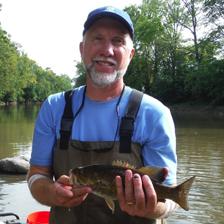 Paul Anderson has served on the Torchbearer Foundation board of directors since 2012 and as the board chairperson since 2014.
Paul Anderson has served on the Torchbearer Foundation board of directors since 2012 and as the board chairperson since 2014.
Paul has served on the missions committee of Grace Baptist Church in Kent, Ohio, for more than 25 years, as a member, deacon and ministry coordinator. Grace Baptist has supported the Torchbearer Foundation from its inception and continues to foster a relationship with the ministry in Africa through prayer and financial support. Over the years, Paul has developed a close friendship with Martin Niboh and shares his vision and dedication to Christian missions and community development. Paul has participated in two international short-term missions trips: to Haiti with his wife, Joan, in 1990 to help an established mission evaluate an aquaculture project, and to Guatemala in 2002 with a group from his church to assist in a building project.
Paul holds a B.S. in biology from the University of Minnesota, and an M.S. in aquatic ecology from Kent State University. He currently works as a senior scientist with the ecological services division of EnviroScience, Inc., in Stow, Ohio. Paul has more than 33 years of professional experience, including 18 years of experience as a field biologist with the Ohio EPA Division of Surface Water. In his position, he was responsible for conducting water quality studies and developing pollution control plans for streams and rivers, inland lakes and Lake Erie. He also is an expert in fish ecology and biology and has extensive experience in the protection of habitat to improve aquatic resources.
Paul and Joan live in Cuyahoga Falls, Ohio, where they recently celebrated their 30th wedding anniversary. They have an adult daughter who is married and lives in Chattanooga, Tennessee.
Paul can be reached at 330.608.5424, or torchbearerohio@gmail.com.
Gayle has had a heart for missions since childhood and has coordinated PLC’s involvement with Operation Christmas Child for the past 10 years. She has served on the Stewardship Committee, Prayer Team, and as President of the congregation. She is currently a member of the choir, a song leader for the contemporary service, a Sunday School teacher, a member of the Altar Guild and a member of the Worship and Music Committee.
Teaching elementary school in Texas for 21 years, Gayle was awarded a Life Time Membership with the Texas PTA, was one of the founders of the Region III ATPE and was elected as its second president in 1981. ATPE is a professional organization for Texas educators. She also served as president of the Victoria ATPE and was listed in the Who’s Who for American Educators in 1991. Gayle retired from teaching in 1994. She holds a Bachelor’s Degree in Elementary Education from Texas Lutheran College in Seguin, Texas.
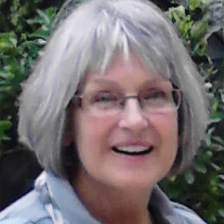 Barb Lanier has recently agreed to serve on the Torchbearer Foundation/Igniting Africa board. Barb is a Kent State University graduate with a BFA in theater and a B.S. in education. She and her husband Eric live in Kent, Ohio.
Barb Lanier has recently agreed to serve on the Torchbearer Foundation/Igniting Africa board. Barb is a Kent State University graduate with a BFA in theater and a B.S. in education. She and her husband Eric live in Kent, Ohio.
Barb retired from Cuyahoga Valley Christian Academy, a private Christian junior high and high school in Cuyahoga Falls, Ohio, in 2014, where she taught art for 22 years. She and Eric continue to work at CVCA as construction helpers on the set design crew for the school’s Royal Theater Company. They have helped out in that capacity for nearly all of her 22 years at CVCA.
Barb and Eric are members of Grace Baptist Church of Kent, where they have worshiped since they accepted Christ in 1974. Both have been involved with Grace’s missions ministry for almost all of the 42 years they’ve been members. Barb and Eric also sing in the worship choir, serve as worship leaders and have helped out with various children’s and adult Christian education positions. Eric has served for many years as an elder at Grace.
They have three grown children, Andy, Amanda and Philip, and three grandchildren, Sam, Eliza and Vivi.
Barb and Eric met Martin Niboh when Martin and Caroline worshipped at Grace during the time Martin was working on his doctorate. They have always felt blessed by Martin’s vision, eloquence and grasp of American humor.
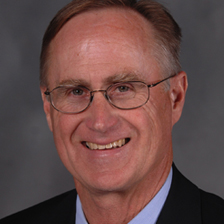 Dale A. Leppo is chairman of Leppo Group, a full-service power equipment sales and rental company with seven locations in northeast and east central Ohio. Leppo Equipment was founded in 1945 by Dale’s grandparents, Roy and Stella Leppo. Leppo Group operates two companies: Leppo Rents and Razor Rents. Leppo Rents’ primary products are Bobcat loaders and excavators, JLG aerial work platforms and tele handlers, and a wide range of other equipment to serve construction, industrial and agricultural customers in northeast Ohio. Razor Rents is focused on the energy markets in east central and southeast Ohio. Dale recently has retired from day-to-day activities, but he continues to work on projects and serve on the company’s leadership team.
Dale A. Leppo is chairman of Leppo Group, a full-service power equipment sales and rental company with seven locations in northeast and east central Ohio. Leppo Equipment was founded in 1945 by Dale’s grandparents, Roy and Stella Leppo. Leppo Group operates two companies: Leppo Rents and Razor Rents. Leppo Rents’ primary products are Bobcat loaders and excavators, JLG aerial work platforms and tele handlers, and a wide range of other equipment to serve construction, industrial and agricultural customers in northeast Ohio. Razor Rents is focused on the energy markets in east central and southeast Ohio. Dale recently has retired from day-to-day activities, but he continues to work on projects and serve on the company’s leadership team.
Dale has served a number of leadership roles in the equipment industry, including seven years on Bobcat’s Dealer Advisory Council, president of Ohio Equipment Distributors, and chairman of the board of Associated Equipment Distributors, an 800-member organization representing equipment distributors in the U.S. and Canada.
Dale’s interest in mechanical things has a personal connection: he is a motorcyclist and has traveled via motorcycle through 39 states, 17 countries outside the U.S. and six continents (missing only Antarctica.)
Dale holds a B.S. in chemistry from Kent State University. A native of northeast Ohio, Dale and his wife Cindy were married in 1974. Cindy also holds a B.S. in chemistry and an MBA from Kent State. They have two children, Emily and Eric, and two grandchildren, Sam and Eliza.
Dale recently has received several accolades and awards, including the Meritorious Service Award (2015) from the Alumni Society of Ohio State University’s College of Food, Agricultural and Environmental Sciences; the Founder’s Award (2015) from Kent State University; and induction into the Hall of Fame of the Kent, Ohio, Public Schools.
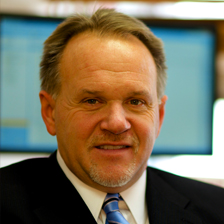 Brent Martin is the newest board member of Torchbearer Foundation after joining the organization in 2016. Brent became acquainted with the Foundation after becoming good friends with Martin Niboh through watching their sons play high school football together. After learning of the vision and dreams of Martin for the country of Cameroon and the continent of Africa, Brent wanted to facilitate the Christian mission and community development efforts of the Foundation.
Brent Martin is the newest board member of Torchbearer Foundation after joining the organization in 2016. Brent became acquainted with the Foundation after becoming good friends with Martin Niboh through watching their sons play high school football together. After learning of the vision and dreams of Martin for the country of Cameroon and the continent of Africa, Brent wanted to facilitate the Christian mission and community development efforts of the Foundation.
Brent has previously served in El Salvador with Living Water International, facilitating the introduction of clean water and Christian principles in third world countries. He has also served for years as a Board member for The Crossing, a large non-denominational church located in Chesterfield, Missouri. Currently, he serves in the Children’s ministry for the Crossing, as well as a board member for Missouri KIDS, an organization which provides direct aid and referral services to severely disabled students and their families. Additionally, he serves as a board member and as the assistant football director for New Melle Sports and Recreation, Inc., a charitable organization which provides interscholastic sports opportunities for kids of all ages.
Brent holds a B.S. degree in Applied Computer Science from Illinois State University. He also received his J.D. degree from St. Louis University and currently is a partner at the law firm of Farrell & Martin, located in St. Peters, Missouri. Brent’s area of expertise if business formation and representation, specializing in facilitating the efforts of individuals wanting to set up their own charitable 501(c)(3) corporations and foundations.
Brent lives in Defiance, Missouri and has two children, Alee (Age 22) and Jake (Age 19). In his free time, he enjoys the outdoors, including travel, fishing, hunting, golfing and snow-boarding.
